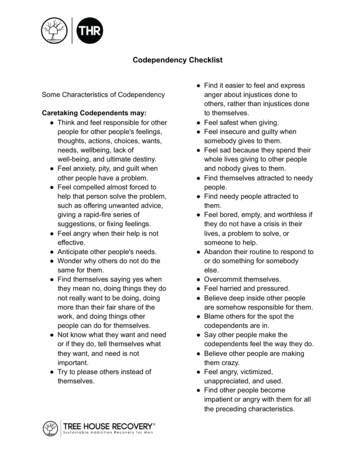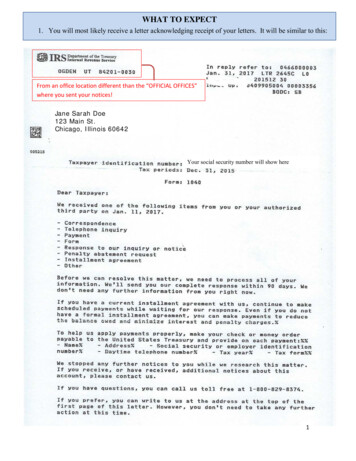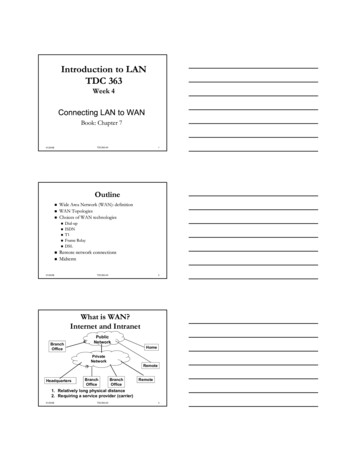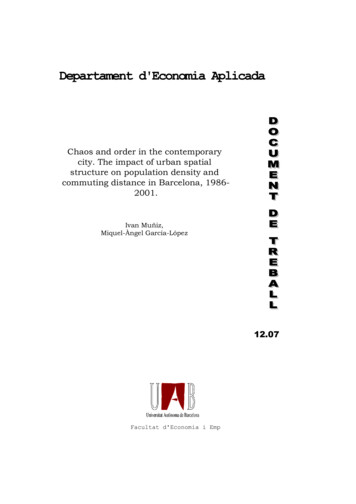
Transcription
Codependency ChecklistSome Characteristics of CodependencyCaretaking Codependents may: Think and feel responsible for otherpeople for other people's feelings,thoughts, actions, choices, wants,needs, wellbeing, lack ofwell-being, and ultimate destiny. Feel anxiety, pity, and guilt whenother people have a problem. Feel compelled almost forced tohelp that person solve the problem,such as offering unwanted advice,giving a rapid-fire series ofsuggestions, or fixing feelings. Feel angry when their help is noteffective. Anticipate other people's needs. Wonder why others do not do thesame for them. Find themselves saying yes whenthey mean no, doing things they donot really want to be doing, doingmore than their fair share of thework, and doing things otherpeople can do for themselves. Not know what they want and needor if they do, tell themselves whatthey want, and need is notimportant. Try to please others instead ofthemselves. Find it easier to feel and expressanger about injustices done toothers, rather than injustices doneto themselves. Feel safest when giving. Feel insecure and guilty whensomebody gives to them. Feel sad because they spend theirwhole lives giving to other peopleand nobody gives to them. Find themselves attracted to needypeople. Find needy people attracted tothem. Feel bored, empty, and worthless ifthey do not have a crisis in theirlives, a problem to solve, orsomeone to help. Abandon their routine to respond toor do something for somebodyelse. Overcommit themselves. Feel harried and pressured. Believe deep inside other peopleare somehow responsible for them. Blame others for the spot thecodependents are in. Say other people make thecodependents feel the way they do. Believe other people are makingthem crazy. Feel angry, victimized,unappreciated, and used. Find other people becomeimpatient or angry with them for allthe preceding characteristics.
Low Self-Worth Codependents might: Come from troubled, repressed,or dysfunctional families. Deny their family was troubled,repressed, or dysfunctional. Blame themselves for everything. Pick on themselves foreverything, including the waythey think, feel, look, act, andbehave. Get angry, defensive,self-righteous, and indignantwhen others blame and criticizethe codependents somethingcodependents regularly do tothemselves. Reject compliments or praise. Get depressed from a lack ofcompliments and praise (strokedeprivation). Feel different from the rest of theworld. Think they are not quite goodenough. Feel guilty about spending moneyon themselves or doingunnecessary or fun things forthemselves. Fear rejection. Take things personally. Have been victims of sexual,physical, or emotional abuse,neglect, abandonment, oralcoholism. Feel like victims. Tell themselves they can't doanything right. Be afraid of making mistakes. Wonder why they have a toughtime making decisions. Expect themselves to doeverything perfectly. Wonder why they can't getanything done to theirsatisfaction. Have a lot of "should." Feel a lot of guilt. Feel ashamed of who they are. Think their lives aren't worthliving. Try to help other people live theirlives instead. Get artificial feelings of self-worthfrom helping others. Get strong feelings of lowself-worth embarrassment,failure, etc. from other people'sfailures and problems. Wish good things would happento them. Believe good things never willhappen. Believe they don't deserve goodthings and happiness. Wish other people would like andlove them. Believe other people couldn'tpossibly like and love them Try to prove they're good enoughfor other people. Settle for being needed.
Repression, Many codependentsmay: Push their thoughts and feelingsout of their awareness becauseof fear and guilt. Become afraid to let themselvesbe who they are Appear rigid and controlled.Obsession, Codependents may: Feel terribly anxious aboutproblems and people. Worry about the silliest things. Think and talk a lot about otherpeople. Lose sleep over problems orother people's behavior. Worry, wonder, wish, and wait Never find answers. Check on people. Try to catch people in acts ofmisbehavior. Feel unable to quit talking,thinking, and worrying aboutother people or problems. Abandon their routine becausethey are so upset aboutsomebody or something. Focus all their energy on otherpeople and problems. Wonder why they never have anyenergy. Wonder why they cannot getthings done.Controlling, Many codependentsmay: Have lived through events andwith people that were out ofcontrol, causing thecodependents sorrow anddisappointment. Become afraid to let other peoplebe who they are and allow eventsto happen naturally. Do not see or deal with their fearof loss of control. Think they know best how thingsshould turn out and how peopleshould behave. Try to control events and peoplethrough helplessness, guilt,coercion, threats, advice-giving,manipulation, or domination. Eventually, fail in their efforts orprovoke people's anger. Get frustrated and angry. Feel controlled by events andpeople.
Denial, Codependents tend to: Ignore problems or pretend theyare not happening. Pretend circumstances are not asbad as they are. tell themselvesthings will be better tomorrow. Stay busy so they don't have tothink about things. Get confused. Get depressed or sick. Go to doctors and gettranquilizers. Become workaholics. Spend money compulsively. Overeat. Pretend those things aren'thappening, either. Watch problems get worse. Believe lies. Lie to themselves. Wonder why they feel like theyare going crazy.Dependency, Many codependentsmay: Do not feel happy, content, orpeaceful with themselves. Look for happiness outsidethemselves. Latch onto whoever or whateverthey think can provide happiness. Feel terribly threatened by theloss of anything or person theythink provides their happiness. Did not feel love and approvalfrom their parents. Do not love themselves. Believe other people can't ordon't love them. Desperately seek love andapproval. Often seek love from peopleincapable of loving. Believe other people are neverthere for them. Equate love with pain. Feel they need people more thanthey want them. Try to prove they are goodenough to be loved. Do not take time to see if otherpeople are good for them. Worry whether other people loveor like them. Do not take time to figure out ifthey love or like other people. Center their lives around otherpeople. Look to relationships to provideall their good feelings Lose interest in their own liveswhen they love. Worry other people will leavethem. Do not believe they can take careof themselves. Stay in relationships that do notwork. Tolerate abuse to keep peopleloving them. Feel trapped in relationships. Leave bad relationships and formnew ones that do not work either. Wonder if they will ever find love.
Poor Communication, Codependentsfrequently: Blame Threaten Coerce. Beg Bribe. Advise. Don't say what they mean. Don't mean what they say. Don't know what they mean. Don't take themselves seriously. Think other people don't take thecodependents seriously. Take themselves too seriously. Ask for what they want and needindirectly sighing, for example. Find it difficult to get to the point. Aren't sure what the point is. Gauge their words carefully toachieve the desired effect. Try to say what they think willplease people. Try to say what they think willprovoke people. Try to say what they hope willmake people do what they wantthem to do. Eliminate the word no from theirvocabulary. Talk too much. Talk about other people. Avoid talking about themselves,their problems, feelings, andthoughts. Say everything is their fault. Say nothing is their fault. Believe their opinions do notmatter. Wait to express their opinionsuntil they know other people'sopinions. Lie to protect and cover-up forpeople they love Lie to protect themselves. Have a difficult time assertingtheir rights. Have a difficult time expressingtheir emotions honestly, openly,and appropriately. Think most of what they have tosay is unimportant. Begin to talk in cynical,self-degrading, or hostile ways, Apologize for bothering people.Weak Boundaries, Codependentsfrequently: Say they will not tolerate certainbehaviors from other people. Gradually increase their toleranceuntil they can tolerate and dothings, they said they neverwould. Let others hurt them. Keep letting people hurt them. Wonder why they hurt so badly. Complain, blame, and try tocontrol while they continue tostand there. Finally get angry then becometotally intolerant.
Lack of Trust, Codependents: Do not trust themselves. Do not trust their feelings Do not trust their decisions. Do not trust other people. Try to trust untrustworthy people. Think God has abandoned them. Lose faith and trust in God.Anger, Many codependents: Feel very scared, hurt, and angry. Live with people who are veryscared, hurt, and angry. Are afraid of their own anger. Are frightened of other people'sanger. Think people will go away ifanger enters the picture Think other people make themfeel angry. Are afraid to make other peoplefeel anger. Feel controlled by other people'sanger. Repress their angry feelings. Cry a lot, get depressed, overeat,undereat, get sick, do mean andnasty things to get even, acthostile, or have violent temperoutbursts. Punish other people for makingthe codependents angry. Have been shamed for feelingangry. Place guilt and shame onthemselves for feeling angry. Feel increasing amounts ofanger, resentment, andbitterness. Feel safer with their anger thanwith hurt feelings. Wonder if they will ever not beangry.Sex Problems, Some codependents: Are caretakers in the bedroom Have sex when they do not wantto. Have sex when they would ratherbe held, nurtured, and loved. Try to have sex when they areangry or hurt. Refuse to enjoy sex becausethey are so angry at their partner. Are afraid of losing control. Have a difficult time asking forwhat they need in bed. Withdraw emotionally from theirpartner. Feel sexual revulsion toward theirpartner. Do not talk about it. Force themselves to have sex,anyway. Reduce sex to a technical act. Wonder why they do not enjoysex. Lose interest in sex. Make up reasons to abstain. Wish their sex partner would die,go away, or sense thecodependent's feelings. Have strong sexual fantasiesabout other people. Consider or have an extramaritalaffair.
Miscellaneous, Codependents tendto: Be extremely responsible. Be extremely irresponsible. Become martyrs, sacrificing theirhappiness and that of others forcauses that do not requiresacrifice. Find it difficult to feel close topeople. Find it difficult to have fun and bespontaneous. Have an overall passiveresponse to codependencycrying, hurt, helplessness. Have an overall aggressiveresponse to codependencyviolence, anger, dominance. Combine passive and aggressiveresponses. Vacillate in decisions andemotions. Laugh when they feel like crying. Stay loyal to their compulsionsand people even when it hurts. Be ashamed about family,personal, or relationshipproblems. Be confused about the nature ofthe problem. Cover up, lie, and protect theproblem. Not seek help because they tellthemselves the problem isn't badenough, or they aren't importantenough. Wonder why the problem doesn'tgo away.Progressive In the later stages ofcodependency, codependents may: Feel lethargic. Feel depressed. Become withdrawn and isolated. Experience a complete loss ofdaily routine and structure. Abuse or neglect their childrenand other responsibilities. Feel hopeless. Begin to plan their escape from arelationship they feel trapped in. Think about suicide. Become violent. Become seriously emotionally,mentally, or physically ill. ·experience an eating disorder(over or undereating). Become addicted to alcohol andother drugs.
well-being, and ultimate destiny. Feel anxiety, pity, and guilt when . they mean no, doing things they do not really want to be doing, doing more than their fair share of the . codependent's feeli











